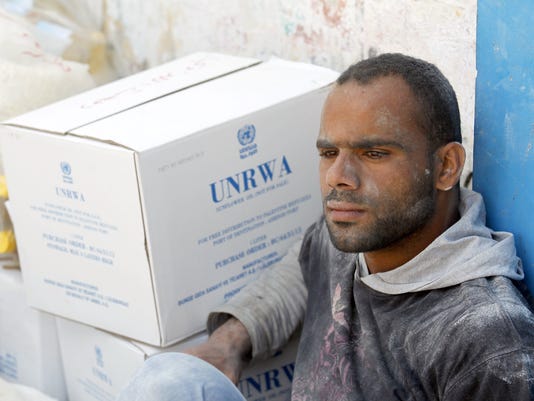
Trump administration to nix funding to U.N. Palestinian refugee program
Deirdre Shesgreen, USA TODAY
She said some countries in the Middle East, including Jordan, Egypt, and Qatar, have stepped up funding for the program, “but the overall international response has not been sufficient.”
She also argued that UNRWA recognizes too many Palestinians as refugees, creating an “endlessly and exponentially expanding community of entitled beneficiaries” that is unsustainable. “The United States will no longer commit further funding to this irredeemably flawed operation,” Nauert stated.
Restrictions in the classification of Palestinian refugees could limit their “right of return” – the concept that those displaced Palestinians would eventually be allowed to return to their homes or communities.
The decision to cut off funding for the Palestinian refugee program comes one week after the Trump administration revoked more than $200 million in economic aid for the West Bank and Gaza. The State Department said that decision came after a review of the funding and took into account the challenges of providing assistance in Gaza, which is controlled by Hamas.
The U.N. agency provides health care to approximately 3 million Palestinians, education assistance to 500,000 children, micro-loans to another 400,000 beneficiaries, among other aid.
"Such a punishment will not succeed to change the fact that the United States no longer has a role in the region and that it is not a part of the solution,” the spokesperson said.
Critics in the U.S. said the Trump administration's decision will cause further suffering among the Palestinians and harm U.S. national security by pushing them into the arms of terrorist groups.
"Further impoverishing Palestinians only empowers extremists, undermines the (Palestinian Authority) and harms Israel’s security," Sen. Dianne Feinstein, D-Calif., a member of the Senate Intelligence Committee, said in a statement Friday. "Completely cutting off funding to UNRWA is inhumane and undermines our own interests in the region."
Samantha Power, who served as the U.S. ambassador to the U.N. during the Obama administration, said the move would further destabilize the Middle East. She noted that UNRWA runs schools, health centers, and provides food for millions of Palestinian families.
"Reckless decision that will be devastating for civilians, especially kids, as schools will have to be shuttered," Powers said in a tweet Friday.
Dave Harden, a former top official at the U.S. Agency for International Development who worked extensively in the West Bank and Gaza, said UNRWA provides vital humanitarian aid to Gazans "who have no means of obtaining essential services." He said the U.S. would cede political influence in the region with this decision.
"When the U.S fails to lead, who will? Hamas and Hezbollah stand ready," Harden said.
Earlier this week, Trump's U.N. ambassador, Nikki Haley, blasted not just UNRWA but also Palestinian leaders, who she said were critical of the U.S. even as they sought funding from Washington.
"The Palestinians continue to bash America ... This is the government, not the people, not the Palestinian people," Haley said at a forum in Washington on Tuesday. At the same time, she said, "They have their hand out wanting UNRWA money."
Nauert, in her statement on Friday, said the State Department was "very mindful of and deeply concerned" about the impact of UNRWA's flawed funding and operating structure on "innocent Palestinians, especially school children."
"... Palestinians, wherever they live, deserve better than an endlessly crisis-driven service provision model," Nauert added. She said the U.S. would work with the U.S., other governments, and international stakeholders "about new models and new approaches," raising the possibility of direct bilateral aid from the United States.
No comments:
Post a Comment